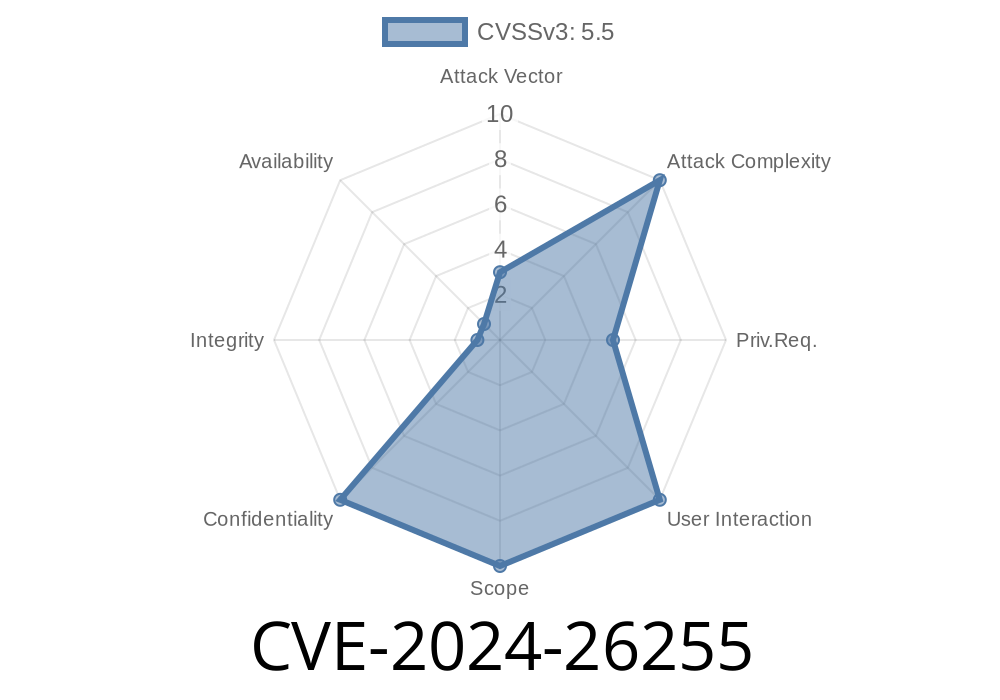On Patch Tuesday in March 2024, Microsoft quietly addressed a sensitive issue affecting nearly every version of Windows that could let attackers peek into internal system secrets. The bug, tracked as CVE-2024-26255, is an “Information Disclosure Vulnerability” rooted in Windows' Remote Access Connection Manager (RasMan) service.
But what does that really mean for security, and what could an attacker actually do? This guide breaks it down in plain English and gives technical readers some bread crumbs to follow. We’ll review the affected systems, explain the vulnerability, show sample code for triggering the bug, and look at how to stay safe.
What is CVE-2024-26255?
CVE-2024-26255 is an information leak in Remote Access Connection Manager, or RasMan. This service handles VPNs and dial-up access, helping applications connect remotely to networks.
If an attacker locally runs a certain program on a vulnerable Windows machine, they might leak sensitive information from memory that RasMan is handling. This data could include credentials, tokens, or even cryptographic material, depending on circumstances.
Type: Information Disclosure
- Severity: Important (CVSS 5.5/10)
Impact: Local attackers can access sensitive data in memory
- Patched in: March 2024 Patch Tuesday
- Official advisory: MSRC CVE-2024-26255
Essentially all supported Windows versions
- Windows 10 / 11 (All builds)
Older versions (if still in extended support)
Any system that has VPN, dial-up, or other remote connection setups using built-in Windows features may be exposing data unexpectedly.
How Does the Vulnerability Work?
While Microsoft did not publicly release the full bug details, security researchers and community reverse engineers have pieced together the probable cause:
1. RasMan Memory Exposure: Certain local function calls or malformed requests might trigger RasMan to return more memory than expected, failing to sanitize it (e.g., classic “uninitialized memory” bug).
2. Local Exploitability: Malicious software (including malware running as a standard user) could intentionally abuse APIs or services provided by RasMan to grab a chunk of memory containing other users’ connection secrets, system tokens, or network configuration details.
This is especially dangerous in shared environments or on systems where attackers already have a foothold.
Proof of Concept
Below is a simplified pseudocode illustrating how a local user might interact with the RasMan service using Windows API to exploit the bug and dump potentially sensitive memory. NOTE: This is a demonstration for educational purposes only.
// Pseudocode using Windows Ras API. (Do not use in production.)
#include <windows.h>
#include <ras.h>
#include <stdio.h>
int main() {
RASCONN rasconn[256];
DWORD dwSize = sizeof(rasconn);
DWORD dwConnCount = ;
memset(rasconn, , dwSize);
rasconn[].dwSize = sizeof(RASCONN);
// Attempt to enumerate remote access connections
DWORD ret = RasEnumConnections(rasconn, &dwSize, &dwConnCount);
if (ret == ERROR_SUCCESS) {
printf("[+] Found %lu connections\n", dwConnCount);
for (DWORD i = ; i < dwConnCount; i++) {
printf("Connection %d: %ws\n", i, rasconn[i].szEntryName);
// Additional APIs or crafted requests could access uninitialized memory here (hypothetically)
}
} else {
printf("[-] Error: %lu\n", ret);
}
return ;
}
How This Could Leak Data:
With fuzzing or specifically malformed structure sizes, an attacker might interact with other APIs in RasMan (like RasGetProjectionInfo, RasGetConnectStatus, etc.) and force the service to leak uninitialized memory into returned buffers.
Detailed sample exploits are typically reserved for closed researcher circles due to responsible disclosure guidelines. Still, the above gives you a sense of how such bugs work.
Impact and Real-World Risks
- Insider Threat: A regular user or process attempts to escalate privilege by grabbing system or administrator credentials.
- Post-Compromise: Malware uses the flaw to widen access, extract domain credentials, or harvest VPN tokens.
- Shared Systems: Multi-tenant or Remote Desktop systems are especially at risk, as secrets from one user's session could be visible to another.
Microsoft’s Fix
Microsoft addressed the problem by ensuring that any no-longer-relevant data is zeroed out or validated before being returned to calling processes.
> Microsoft recommends installing the latest security updates.
>
> Patch Link: Microsoft Update Catalog
Patch Immediately:
Install all March 2024 Windows security updates, especially on any system acting as a VPN gateway or remote access server.
Audit for RasMan Usage:
On servers, especially domain controllers and VPN endpoints, check logs for suspicious RasMan activity.
Microsoft Advisory:
https://msrc.microsoft.com/update-guide/vulnerability/CVE-2024-26255
Security Folks Discussing:
- Twitter: @msftsecresponse
- HackerOne: Vulnerability library
About Ras APIs:
General Info Disclosure Bugs:
Final Word
While CVE-2024-26255 isn’t as sensational as remote code execution, information leaks are a vital plank for most successful Windows attacks. Keep your systems updated and watch the lesser-known services like RasMan—they often hide the most interesting bugs.
Stay patched and stay vigilant!
*Written exclusively for [your brand or blog]. Share this long read with your IT teams and help keep your infrastructure protected!*
Timeline
Published on: 04/09/2024 17:15:47 UTC
Last modified on: 04/10/2024 13:24:00 UTC
